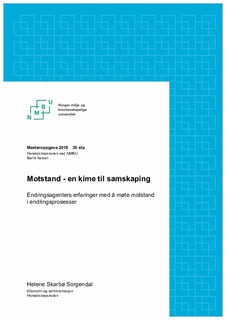| dc.contributor.advisor | Aarset, Bernt | |
| dc.contributor.author | Sorgendal, Helene Skarbø | |
| dc.date.accessioned | 2018-11-20T14:02:21Z | |
| dc.date.available | 2018-11-20T14:02:21Z | |
| dc.date.issued | 2018 | |
| dc.identifier.uri | http://hdl.handle.net/11250/2574008 | |
| dc.description.abstract | Hensikten med denne studien er å se på hvordan linjeledere i to vidt forskjellige organisasjoner erfarer å møte motstand i endringsprosesser, og hvordan de opplever at egen kompetanse blir utfordret i rollen som endringsagent. Problemstillingen for denne studien er: ”Hvordan erfarer endringsagentene at de blir utfordret i møte med motstand, og hva betyr denne erfaringen for endringsprosessen?” For å svare på denne problemstillingen har jeg anvendt et kvalitativt forskningsdesign med en fenomenologisk tilnærming, der jeg har gjennomført fire dybdeintervjuer med linjeledere i to ulike organisasjoner.
Funnene fra studien indikerer at endringsagentenes fokus, forståelse og tilnærming til motstand påvirker hvordan de håndterer motstanden og i hvilken grad de åpner opp for samskaping i en endringsprosess. Funnene viser videre at endringsagenten bygger tillit til de ansatte gjennom å være åpen og ærlig, samtidig vil denne tilnærmingen kunne utfordre det å fremstå som kompetent og endringsagentens egen opplevelse av å være kompetent. Funnene indikerer at å lytte uten å være åpen for dialog vil kunne begrense endringens potensial samt øke motstanden fra ansatte. Ved å klare å lytte åpent til motstanden fra ansatte vil endringsagenten kunne skape et aksepterende miljø som kan bygge oppunder ansattes mestringsforventning og følelse av tilhørighet.
Studien viser at ved å ikke fokusere på å bli kvitt motstanden, men å stå i den og møte de ansatte i deres opplevelse, vil man kunne gjøre motstanden til noe konstruktivt som kan føre til mer kreativitet, læring og fruktbare resultater. Når gjensidig tillit, åpen lytting samt endringsagentens opplevelse av å være kompetent og fremstå som dette er tilstede, vil motstanden kunne være en kime til samskaping.
Datamaterialet indikerer også en forskjell mellom medvirkning og samskaping. Samskapingen innebærer å spille mer på de ansattes ressurser og kompetanse, som trolig også underbygger ansattes opplevelse av å bli hørt. | nb_NO |
| dc.description.abstract | The purpose of this research is to look at how line managers in two widely different organizations experience meeting resistance in change processes and how they perceive that their own competence is challenged in the role of change agent. The research question for this study is: "How do the change agent experience being challenged when facing resistance, and what does this experience mean for the change process?”. In order to answer this thesis, I have used a qualitative research design with a phenomenological approach, and I have conducted four indepth interviews with line managers in two different organizations.
The findings from the research indicate that the change agents' focus, understanding and approach to resistance affect how they deal with resistance and to what degree they open up for co-creation in a change process. The findings further show that the change agent can build trust by being open and honest, at the same time this approach could challenge the change agent appearance as competent as well as their own experience of being competent. The findings indicate that listening without being open to dialogue could limit the potential of change and increase the resistance from the employees. By being able to listen openly to the employees’ resistance, the change agent can create an accepting environment that can build up on employees' self-efficacy and sense of relatedness.
This research shows that by not focusing on getting rid of resistance, but standing in it and meeting the employees in their experience, one can make the resistance to something constructive that can lead to more creativity, learning and fruitful results. When you have mutual trust, genuine listening, and the change agent's experience of being competent and appearing as it is present, resistance will be a co-ordination of co-creation.
The data material also indicates a difference between involvement and co-creation. The cooperation involves playing more on the employees' resources and competencies, which probably also enhance the employee's experience of being heard. | nb_NO |
| dc.language.iso | nob | nb_NO |
| dc.publisher | Norwegian University of Life Sciences, Ås | nb_NO |
| dc.rights | Navngivelse 4.0 Internasjonal | * |
| dc.rights | Navngivelse 4.0 Internasjonal | * |
| dc.rights.uri | http://creativecommons.org/licenses/by/4.0/deed.no | * |
| dc.rights.uri | http://creativecommons.org/licenses/by/4.0/deed.no | * |
| dc.subject | Medvirkning | nb_NO |
| dc.title | Motstand : en kime til samskaping : endringsagenters erfaringer med å møte motstand i endringsprosesser | nb_NO |
| dc.type | Master thesis | nb_NO |
| dc.source.pagenumber | 70 | nb_NO |
| dc.description.localcode | M-ØA | nb_NO |

